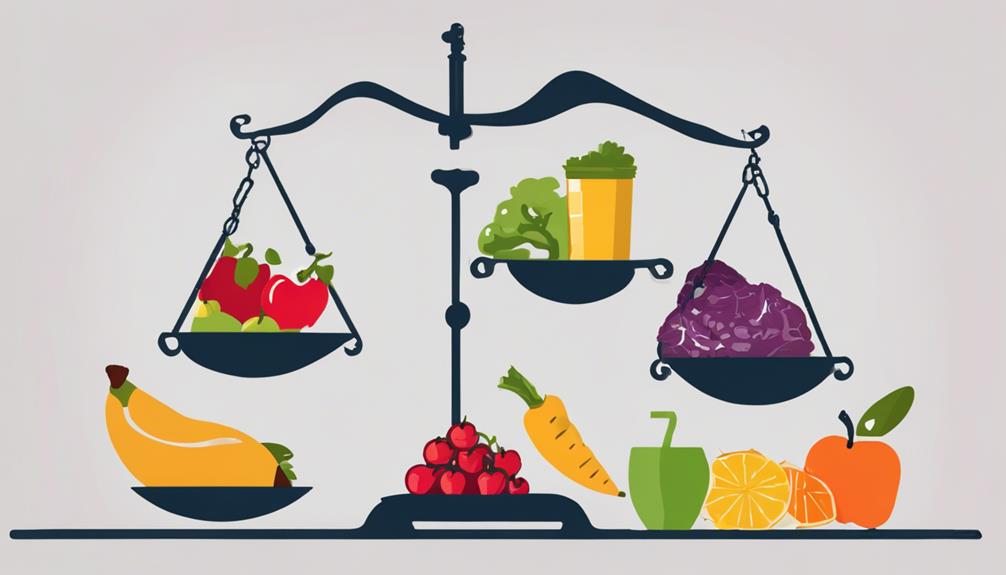Oscillating between virtue and vice, this exploration of bulking challenges readers to ponder its ethical and spiritual implications.

Is Bulking a Sin?
Picture yourself standing in front of a mirror, muscles bulging, a testament to countless hours of lifting and disciplined eating. You've embraced bulking as a pathway to physical improvement, but have you ever paused to consider if this pursuit veers into the realm of excess or, more pointedly, sin?
This question bridges the physical and the philosophical, challenging you to reflect on the ethical and spiritual dimensions of pushing your body's limits. As we explore the fine line between self-improvement and gluttony, you might find yourself questioning where virtue ends and vice begins.
Key Takeaways
- Bulking, when done with health-oriented goals, differs morally from gluttony due to its focus on moderation and intent.
- Ethical considerations of bulking include environmental impacts and societal perceptions, emphasizing the need for mindful and informed decision-making.
- Spiritual traditions advocate for balancing physical care with spiritual growth, not viewing physical improvement as inherently sinful.
- Approaching bulking with mindfulness, aiming for nutritional balance and sustainable practices, aligns with ethical and spiritual guidelines for physical improvement.
Defining Bulking and Gluttony

To understand the debate surrounding bulking and its perceived moral implications, it's crucial to first define what bulking and gluttony entail in both physical fitness and ethical contexts.
Bulking, in the realm of physical fitness, refers to a dietary strategy aimed at muscle building. You increase your caloric intake beyond your body's daily energy needs with the goal of gaining muscle mass alongside minimal fat. It's a deliberate, controlled process, often accompanied by rigorous training regimens to ensure that the extra calories contribute to muscle growth rather than excessive fat storage.
On the other hand, gluttony is traditionally understood in ethical discussions as excessive eating and drinking to the point of waste or harm, reflecting a lack of self-control or disregard for the necessity of moderation. It's key to distinguish that while bulking involves an increase in food consumption, it's driven by specific, health-oriented goals rather than indulgence or lack of discipline.
Thus, when you're evaluating bulking through a moral lens, it's important to consider the intent and outcomes of these dietary strategies. The focus on muscle building, when done responsibly, differentiates bulking from acts of gluttony, highlighting the importance of context in discussions about diet and morality.
Historical Perspectives on Excess
Throughout history, societies have often grappled with the concept of excess, viewing it through varying lenses of morality, health, and societal impact. This complex relationship can be seen in the alternating periods of feast famines and the displays of cultural opulence that have dotted human civilization.
- Feast Famine Cycles: Ancient records and archaeological findings reveal that societies alternated between times of abundance and scarcity. During periods of plenty, communities would often engage in feasting and celebrations, a stark contrast to the times of famine where resources were scarce.
- Cultural Opulence: In various cultures, the display of excess wasn't only a sign of wealth but also a tool for political and social maneuvering. Lavish banquets and extravagant spending were means to display power, forge alliances, and assert social status.
- Moral and Health Perspectives: Philosophers and health practitioners throughout the ages have debated the morality and health implications of excess. Some cultures viewed moderation as a virtue and excess as a vice, whereas others saw indulgence in food and drink as an integral part of social and religious ceremonies.
Understanding the historical perspectives on excess provides insights into how past societies navigated the complex interplay between abundance, morality, and health.
Ethical Considerations of Bulking

Diving into the ethical considerations of bulking, it's essential to examine how this practice aligns with principles of health, fairness, and societal impact. You might wonder how your personal fitness goals could ripple out to affect broader issues. Yet, the choices you make, including dietary and exercise regimens, inevitably intersect with larger ethical concerns.
Consider the environmental impact of bulking. High-calorie diets often require increased consumption of animal products and resource-intensive foods. This dietary shift can lead to a larger carbon footprint and greater strain on environmental resources. It's crucial to weigh the personal benefits of bulking against these potential environmental costs.
Cultural perceptions also play a significant role in the ethics of bulking. In societies where food scarcity affects many, the practice of consuming excess calories for muscle gain could be viewed as insensitive or privileged. Moreover, the emphasis on achieving a certain physique can reinforce unattainable beauty standards, contributing to body image issues and societal pressures.
Balancing these ethical considerations requires mindfulness and informed decision-making. By acknowledging the broader implications of your choices, you're better positioned to navigate the complex terrain of ethics in personal health and fitness.
Health Implications and Moderation
Acknowledging the broader implications of bulking leads us to consider its health implications and the importance of moderation in pursuit of fitness goals. While bulking can be a powerful tool for gaining muscle, it's essential to approach it with a mindful strategy focused on health and sustainability.
Here are three critical components to keep in mind:
- Nutritional Balance: It's not just about consuming more calories; it's about ensuring those calories are from nutrient-rich sources. A balanced diet supports muscle growth and overall health.
- Exercise Importance: Regular, varied exercise ensures that the weight you gain is muscle, not fat. Strength training, in particular, is crucial, but don't neglect cardiovascular health.
- Moderation and Listening to Your Body: Overeating or pushing your body too hard can lead to negative health outcomes, including increased fat mass, strained organs, and a higher risk of diseases. It's vital to listen to your body's signals and adjust your bulking strategy accordingly.
Incorporating these principles ensures that your bulking phase supports not just muscle growth but overall well-being. Sustainable practices in fitness journeys are crucial for long-term success and health.
Spiritual Views on Physical Improvement

Exploring spiritual perspectives reveals that many traditions see physical improvement as a path to enhancing not only bodily health but also spiritual well-being. You'll find that the concept of body sanctity is central in these views. This idea suggests that your body is a temple and taking care of it's a form of respect and gratitude to the divine or the universe. It's about nurturing the vessel that carries your spirit through life.
However, it's crucial to distinguish between caring for your body and falling into spiritual vanity. Spiritual vanity is an attachment or excessive pride in physical appearance for its own sake, rather than for health or spiritual alignment. It's when the pursuit of physical improvement crosses into the realm of ego and self-obsession, losing sight of the deeper spiritual intentions.
Most spiritual traditions advocate for a balance. They encourage physical care and improvement while cautioning against letting these pursuits overshadow spiritual growth and humility. This balance ensures that efforts to enhance physical health are aligned with spiritual values, avoiding the pitfalls of vanity and maintaining the sanctity of the body.
Frequently Asked Questions
How Does Bulking Affect Mental Health and Body Image, Especially in the Context of Social Media Influence?
Bulking can impact your mental health and body image, as social media often amplifies peer pressure and challenges your emotional resilience. It's crucial to navigate these influences carefully to maintain a positive self-perception.
Can Bulking Be Pursued Sustainably and Environmentally Friendly, Considering Increased Food Consumption?
You can bulk up sustainably by choosing plant-based options, which generally require less water usage than animal products. This approach not only supports your health goals but also reduces your environmental footprint.
What Are the Economic Impacts of Bulking, Both on an Individual's Budget and the Broader Food Industry?
Bulking affects your budget and the food industry, leading to varied agricultural impacts and influencing consumer trends. It requires more resources, potentially driving up costs and shaping demand for certain agricultural products.
How Does Bulking Intersect With Cultural Norms and Expectations Around Body Size and Strength in Different Societies?
You'll find that bulking intersects with cultural norms around body size through religious interpretations and its historical evolution. Different societies view strength and body size uniquely, influenced by tradition and modern health perspectives.
What Role Does Genetics Play in the Effectiveness and Health Risks of Bulking, and How Can Individuals Navigate These Factors?
Genetics significantly influence your bulking success and risks, including muscle memory and genetic limits. You'll need to understand these limitations and work within them to optimize health while pursuing your bodybuilding or strength goals.
Conclusion
In conclusion, bulking, when approached with balance and mindfulness, isn't inherently a sin. Historical and spiritual perspectives emphasize moderation over excess, suggesting that the intent and methods behind physical improvement matter greatly.
Ethical considerations highlight the importance of health and well-being, advocating for a balanced approach to achieving physical goals. Ultimately, it's your intention and approach to bulking that define its moral standing, encouraging a path of moderation and respect for your body's needs.



Sign up